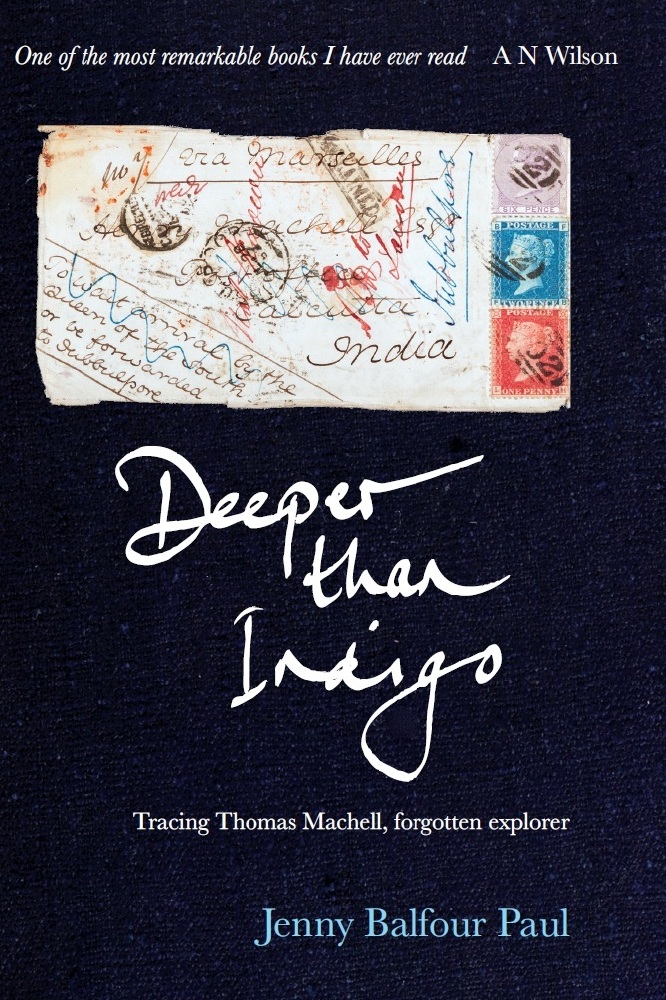If you dream of being a writer it isn't essential to travel, but nevertheless, travelling can help a writer find inspiration and perspective. For me, as for many others, travel has been stimulating and inspiring for many reasons:

Deeper Than Indigo
1. To get new material. Experiencing other cultures can be intoxicating, exciting, and transporting. People and experiences are usually central to a story, but the setting too can be crucial. The culture, history and politics of another country can provide new backdrops to a human story. There's nothing more evocative than unaccustomed scents, sounds and sights: a spice market; jasmine on a humid hot night; children playing games in a foreign tongue; a monkey leaping over a rooftop.
2. To create space in your head. When you travel and get away from normal routines, daily tramlines, locations and circles of people, you enter a new time and space. This opens up room in your own mind for different ideas, new thoughts and ways of looking at things, of being more open-minded and creative.
3. To find a place and time to write. Sometimes, and especially when daily life is crowded with work and/or family cares such as looking after children or elderly relatives, travelling provides the essential time and physical place required to plan and to get thoughts formulated and onto paper or laptop.
4. To find new perspectives. With a mass media determined to focus on the bad and sensational, it is easy to forget that most people in whatever country and culture have similar concerns. Travel allows you to discover alternative narratives that break down distorted stereotypes . An example of this might be to find that in countries where women are portrayed as suppressed they have incredible strengths and unexpected jollity.
5. To develop empathy. Of course you can do this anywhere, but daily life often leaves little time to listen properly to other people, or imagine being in their shoes (essential for a writer). While travelling it's often easier to find time to listen attentively to strangers. It's surprising how much people like to divulge about themselves and their lives and how fascinating and unexpected people's stories, and slants on life, can be.
By listening to a great variety of people speaking you also get a feel for dialogue. This is useful because writing comes alive with believable dialogue but can be spoilt by dialogue that doesn't ring true.
6. To discover a new 'you'. Meeting strangers who have no preconceptions about you gives total freedom to be a new you - or rediscover an old you - and this can be a wonderful and expanding revelation. When I travelled by container ship to India in 2010, retracing a sea voyage I had undertaken forty years earlier, I somehow became - in that sea limbo - the teenage me in a different form and this was reflected in my writing style.
7. To go off the beaten track and push back the boundaries. My favourite saying is Ralph Waldo Emerson's 'Do not go where the path may lead: go instead where there is no path and leave a trail.' Travelling independently can be the best way to broaden the mind and make you more observant. However, it's essential to get away from tourist traps and your 'comfort zone'. If you remain in a group of people of similar background to you, you won't learn very much. I have had my most illuminating experiences sitting on a dirt floor in a remote village; it's not essential to have a language in common, though it helps to have some words of the local language.
Travel is like a metaphor for writing itself. It's often hard to get started, due to the fear of the unknown or the blank page. 'Feel the fear and do it anyway' is one of those well-worn expressions that often pop into my head. Travel often leads to unpredictable and shifting outcomes; writing, likewise, is a journey that evolves in surprising ways, however well plotted out in advance.
8. To learn to keep a record. Travelling can provide the opportunity to get in the habit of keeping a diary or making notes in new situations. It's often hard to be disciplined to do this as part of the daily routine at home, whereas it can easily be fitted in when travelling and provides a chance to try out different ways to describe things not considered before . I find train journeys particularly conducive to diary writing. Writing things down trains you to notice things - in modern jargon, to be more 'mindful'.
9. To find a different approach the concept of 'travel'. Travel brochures make it seem essential to get on an aeroplane and fly to hot and exotic destinations overseas, whereas the most interesting travel can be within one's own country or in a country not noted for its allure, especially if not too planned. It's important to have leeway to open up to random conversations in such mundane locations as buses or cafes, or allow for the unexpected to happen. There is nothing like a surprise adventure!
10. To appreciate the local. Last, but perhaps most important of all, geographical travel often serves to make you realize the riches that exist at home. As poet Charles Causley wrote: 'Why do you travel so far for what is most near? The smallest coin in your purse buys what is most dear.' People everywhere have interesting stories or angles on life, and it's also possible to voyage around a space as small as a single room. And of course the potential for journeys inside your own head or those of your characters is infinite.

